RESPECT, HONOR AND GRATITUDE

WITH RESPECT, HONOR AND GRATITUDE
Two veterans share their military experiences and how they translated to the insurance business
By Christopher W. Cook
Every November, I write my “Salute to Service” feature, thanking veterans in the insurance industry for their contributions while in the military and at their current positions. This month, we’ll continue the tradition. Attention!
Air Force First Lieutenant Wittenbaum
At 88 years old, Jay Wittenbaum, owner of S P Agency, Inc., in Cincinnati, Ohio, still reports to the office, where his sons, Fred and Brad, have taken over the bulk of the duties. “I do the quality control,” he says. “Every day I look at between five and 10 personal accounts and critique them. I have a very good system.”
But before entering the insurance industry, Wittenbaum experienced a unique military career. During his preteen years, his next-door neighbor was “the bad boy always getting in trouble,” he recalls. “His parents sent him to military school, and when he’d come home in the summer, he taught me how to march and all the terminology.”
Wittenbaum attended—and would earn a degree in business administration from—the University of Cincinnati (UC). “In those days, you had to take ROTC (Reserve Officers’ Training Corps) and I was always enamored with the Air Force because the first plane was built in Dayton, Ohio, so I decided to go into the Air Force,” he says.
Having missed the Korean War by a few years, Wittenbaum went to Langley Air Force Base in Virginia in1957 before reporting to Lackland in San Antonio in ‘58. There, he went through pilot training. “I jumped with a parachute twice (he doesn’t recommend it), qualified with an M1 rifle and a 38-caliber pistol, did KP (kitchen patrol) duty, crawled through the mud with a machine gun shooting over my head, and flew in a jet plane,” he says.
The pilot during his flight test was an acquaintance from ROTC at UC. “He said to me, ‘This is going to be the worst day of your life.’ He was right; I was sick as a dog,” Wittenbaum says with a laugh. “I did not make pilot, but they said if you signed up for three years instead of two of active duty that they would give you your choice of assignments.”
Wittenbaum received his first choice and departed for London. While waiting for an assignment, he stayed at Officers Club 95 Lancaster Gate, in downtown London, and saw all the sights of the city. “One day, I got a call to come out to the base and they said, ‘Well, we’re not sure what we are going to offer you,’” Wittenbaum says. “I became an assistant club officer, the assistant general manager at the hotel where I had been staying.
“The greatest way of learning about a hotel is on the job. I immediately became head of the finance of the club—the money and the property. Every day I did inventory and if anything was missing, it would be my fault. We had 18 slot machines in a locked room, and I made sure that the room was locked when they weren’t being used.”
As he transitioned into the position, Wittenbaum would also be responsible for the staffs of the hotel and the two bars on the property. He was also in charge of the club’s entertainment and served as emcee during the early portion of his time there. “I met all the top entertainment who worked in London, from Richard Dawson, Matt Munro and Shirley Bassey, to almost meeting Elvis Presley,” he says. (That’s another story.)
“I was in charge, and I wanted to learn everything about hotel management that I could in as short of time as possible because I wanted to be able to go back home and say that I was successful.”
Another duty that Wittenbaum found himself doing was frequently visiting court. “The Status of Forces Agreement between the Americans and the British in the ‘50s said that if an American officer or enlisted man is on trial in an English court, an American officer would have to be in attendance, and I was living about 10 minutes away from Marylebone High Court,” he says. “I used to get calls all the time.”

“There’s room [in the insurance industry] for a lot of well-trained, well-educated people,
and the military is the greatest teaching facility in the world.”
—Jay Wittenbaum
Owner
S P Agency, Inc.
Wittenbaum’s assignment in London ended in early 1960, so he spent months traveling across Europe in his newly purchased Austin-Healey 3000 sports car. “I had friends who were going to the Summer Olympics in Rome, so I lined up to meet up with people during my travels.” Of the people he met up with, he did not anticipate that it would lead to meeting Geoffrey Fisher, the Archbishop of Canterbury. At the Olympic Games he saw Oscar Robertson and team U.S.A. win the gold medal. (Wittenbaum told a story about how he once attempted to give Robertson a ride to Indianapolis from UC during his college years. Unfortunately, car trouble ended the road trip early, and the future NBA player finished the journey by Greyhound bus.)
In December 1960, Wittenbaum returned to Cincinnati, and was introduced to the insurance industry through a job service organization. At the job service, military personnel could take tests to determine which occupation fit them best, but the person Wittenbaum spoke to “knew a guy.”
“I went and met him on the second floor of the Playboy Club building in Cincinnati,” Wittenbaum recalls. “We sat down and talked military. I liked him, so I took the job at I & B Agency.
“I had to train myself, which was not unusual for me, and I worked from the seventh grade through five years of college—around 30 to 40 different jobs—so I could do just about anything except fix a car.”
In 1961, Wittenbaum was recalled to service during the Berlin Crisis; the agency held his position for him. In Germany, he oversaw the food service for the 108th ACW (Air Control & Warning Unit), who were sent to aid with radar operations.
“I had no idea what we were going to do, but we were operational in two weeks before all the rest came,” Wittenbaum says, “and we served a good meal. I would drive down once a month to pick up the food at Kastle Air Force Base, which is right on the Berlin Wall about an hour and a half away. I was really put to work, and it was successful. I even set up an officer’s club.”
After his time in the Air Force, Wittenbaum was offered jobs at a civilian club in Paris and the 21 Club in New York through acquaintances. “I turned them down; I wanted to succeed in Cincinnati and eventually be my own boss,” he says.
He returned to work at S P Agency, which was owned by members of the same family as I & B. While there, he would attend a three-month course at the Insurance Company of North America’s school for agents in Philadelphia.
“I took a work approach based on my college, work, and club management experiences—getting the job done and not accepting defeat,” he says. This led to Wittenbaum’s purchasing the agency five years later.
“I highly recommend the insurance business for anybody who wants to be an executive. There’s a great need for qualified people all over the country, and I think veterans are the greatest,” Wittenbaum says. “There’s room for a lot of well-trained, well-educated people, and the military is the greatest teaching facility in the world.”
Army Major Thomas
Ash Thomas, branch manager at Risk Placement Services, currently serves in the Army Reserves after 10 years of active duty.
He began his military career in 2006 in the United States Army’s 2nd Infantry Division, where he was a rifle Platoon leader. In 2008, he was deployed to Afghanistan.
In 2010, he became the information operations planner with 3rd Infantry Division in Fort Stewart, Georgia, with two additional deployments to Afghanistan. During these deployments, in addition to his duties as the Chief Information Operations planner, Thomas also worked with the Afghan Army to train them on information operations and strategic communications.
In 2014, Thomas was reassigned to Fort Belvoir in Virginia as part of the 1st Information Operations command, while also serving a deployment to East Africa as the lead Strategic Communications planner, where he coordinated communication efforts between the U.S. Military, Foreign Nations and Department of State.

“There are several developmental programs available that will help veterans transition into a new role,
and they will find that the sky is the limit in this industry.”
—Ash Thomas
Branch Manager
Risk Placement Services
After the Army, it was a chance interview that introduced Thomas to the insurance industry. “When transitioning out, I knew I wanted to be in a client-facing/business development role. When I learned more about how dynamic this industry is, I wanted all in,” Thomas says. “There is no limit to what can be accomplished. It’s always interesting; one gets to be creative and innovative at every corner. The people in this industry are amazing and super collaborative.”

Thomas began his career in 2016 as a brokerage underwriter with All Risks, Ltd.; he moved to RPS and his current position in 2020.
His military experience prepared him well for the transition. “Military service teaches a lot about risk management, which helped me understand the insurance industry better,” he says. “We had to constantly evaluate hazards for our missions and how to put controls in place, which translated well into underwriting.
“The military also instills a high level of work ethic combined with discipline and organization skills. Additionally, the dynamic nature of military missions forces one to ‘figure it out’ quickly. The insurance industry is fast-paced and requires the implementation of all these skills.”
Thomas certainly does recommend the insurance industry for veterans. “The opportunities are unlimited for veterans,” he says. “Several insurance leaders mention a talent gap in our industry and veterans can help fill some of that void.
“Veterans will find that this industry is welcoming and collaborative. The raw skills that the military has developed are highly desirable in the insurance industry. There are several developmental programs available that will help veterans transition into a new role, and they will find that the sky is the limit in this industry,” he concludes.











